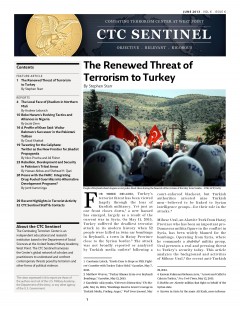Cover Story Overview
The Renewed Threat of Terrorism to Turkey
By Stephen Starr
For three decades, Turkey’s terrorist threat has been viewed largely through the lens of Kurdish militancy. Yet just as one front closes down, a new hazard has emerged, primarily as a result of the current war in Syria. On May 11, 2013, Turkey suffered the deadliest terrorist attack in its modern history when 52 people were killed in twin car bombings in Reyhanli, a town in Hatay Province close to the Syrian border. The attack was not broadly reported by Turkish media outlets following a court-enforced blackout. Mihrac Ural, an Alawite Turk from Hatay Province who has been an important pro-Damascus militia figure in the conflict in Syria, has been widely blamed for the bombings. Operating from Syria, where he commands a shabiha militia group, Ural presents a real and pressing threat to Turkey’s security today. This article analyzes the background and activities of Mihrac Ural, the recent anti-Turkish operations of the Revolutionary People’s Liberation Party/Front (DHKP/C), and the effects of the Syria conflict on the security of the Republic of Turkey. It finds that the increasing destruction of the Syrian state will likely contribute to new terrorist threats against Turkey, forcing Ankara to recalibrate its security and counterterrorism policies.
 Skip to content
Skip to content

